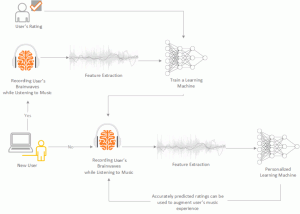-
7
Sep
We investigated the possibility of using a machine-learning scheme in conjunction with commercial wearable EEG-devices for translating listener’s subjective experience of music into scores that can be used in popular on-demand music streaming services.
Our study resulted into two variants, differing in terms of performance and execution time, and hence, subserving distinct applications in online streaming music platforms. The first method, NeuroPicks, is extremely accurate but slower. It is based on the well-established neuroscientific concepts of brainwave frequency bands, activation asymmetry index and cross frequency coupling (CFC). The second method, NeuroPicksVQ, offers prompt predictions of lower credibility and relies on a custom-built version of vector quantization procedure that facilitates a novel parameterization of the music-modulated brainwaves. Beyond the feature engineering step, both methods exploit the inherent efficiency of extreme learning machines (ELMs) so as to translate, in a personalized fashion, the derived patterns into a listener’s score. NeuroPicks method may find applications as an integral part of contemporary music recommendation systems, while NeuroPicksVQ can control the selection of music tracks. Encouraging experimental results, from a pragmatic use of the systems, are presented.
The paper is to appear in Neurocomputing as:
Fotis Kalaganis, Dimitrios A. Adamos, Nikos Laskaris. Musical NeuroPicks: a consumer-grade BCI for on-demand music streaming services, Neurocomputing (2017).
A preview is available through arXiv.org or ResearchGate.net
- Published by Dimitrios A. Adamos in: Documentation
- RSS feed subscription!


 Neurobot via RSS
Neurobot via RSS
